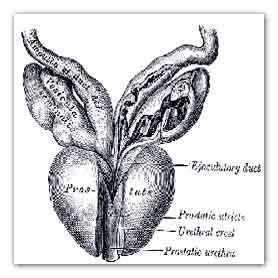|
Men with prostate cancer have several treatment
options, which include active surveillance,
radiation and removing the gland altogether. All
have potential side effects.

The Prostate - Henry Gray - Anatomy of the Human Body
Sexual dysfunction remains common after treatment,
including erectile dysfunction (ED), changes in
orgasm and penile morphology. The incidence of these
problems varies depending upon the definition used
as well as the timing and method of patient
assessment after definitive treatment.
Previous studies have shown that the perceptions of
urologists and the expectations of the patients do
not necessarily concur.
Clinical experience suggests that some radical
prostatectomy (RP) patients have unrealistic
expectations with regard to their long-term sexual
function.
A new study was undertaken in an effort to assess
the understanding of patients who underwent radical
prostatectomy with regard to their postoperative
sexual function.
Patients presenting within 3 months of their radical
prostatectomy (open and robotic) were questioned
regarding the sexual function information that they
had received pre-operatively.
Patients were questioned about erectile function,
postoperative ejaculatory status, orgasm and
postoperative penile morphology changes. Statistical
analyses were performed to assess for differences
between patients who underwent open versus robotic
radical prostatectomy.
As reported in BJU International, Mulhall and
colleagues surveyed 336 consecutive patients (from 9
surgeons) with a mean age of 64±11 years had the
survey instrument administered (216 underwent open
and 120 underwent robotic radical prostatectomy).
No significant differences existed in patient age or
comorbidity profiles between the two groups.
Only 38% of men had an accurate recollection of
their nerve sparing status.
The mean (SD) elapsed time post-RP at the time of
postoperative assessment was 3 months.
Robotic radical prostatectomy patients expected
shorter EF recovery time (6 vs 12 months, p=0.02), a
higher likelihood of recovery back to baseline
erectile function (75 vs. 50%, p=0.01), and lower
potential need for ICI (4 vs. 20%, p=0.01).
None of the robotic RP patients and only 10% of open
RP patients recalled being informed of the potential
for penile length loss (p<0.01) and none were aware
of the association between RP and Peyronie’s
disease.
Almost half of all patients were unaware that they
were rendered anejaculatory by their surgery.
Patients who have undergone radical prostatectomy
have largely unrealistic expectations with regard to
their postoperative sexual function. Disclosure does
not equate to understanding.
For more information
A survey of patient expectations regarding sexual
function following radical prostatectomy
Link...
MDN |